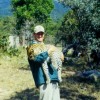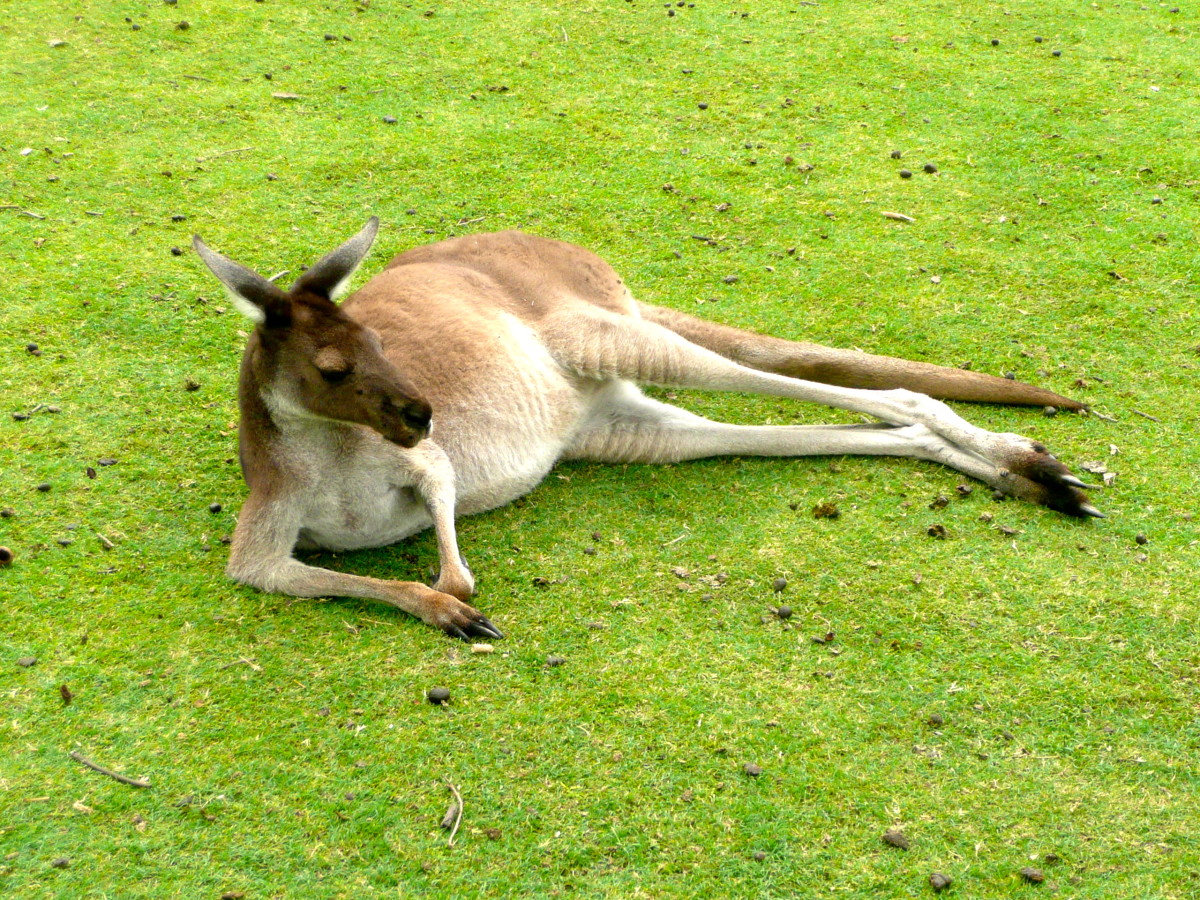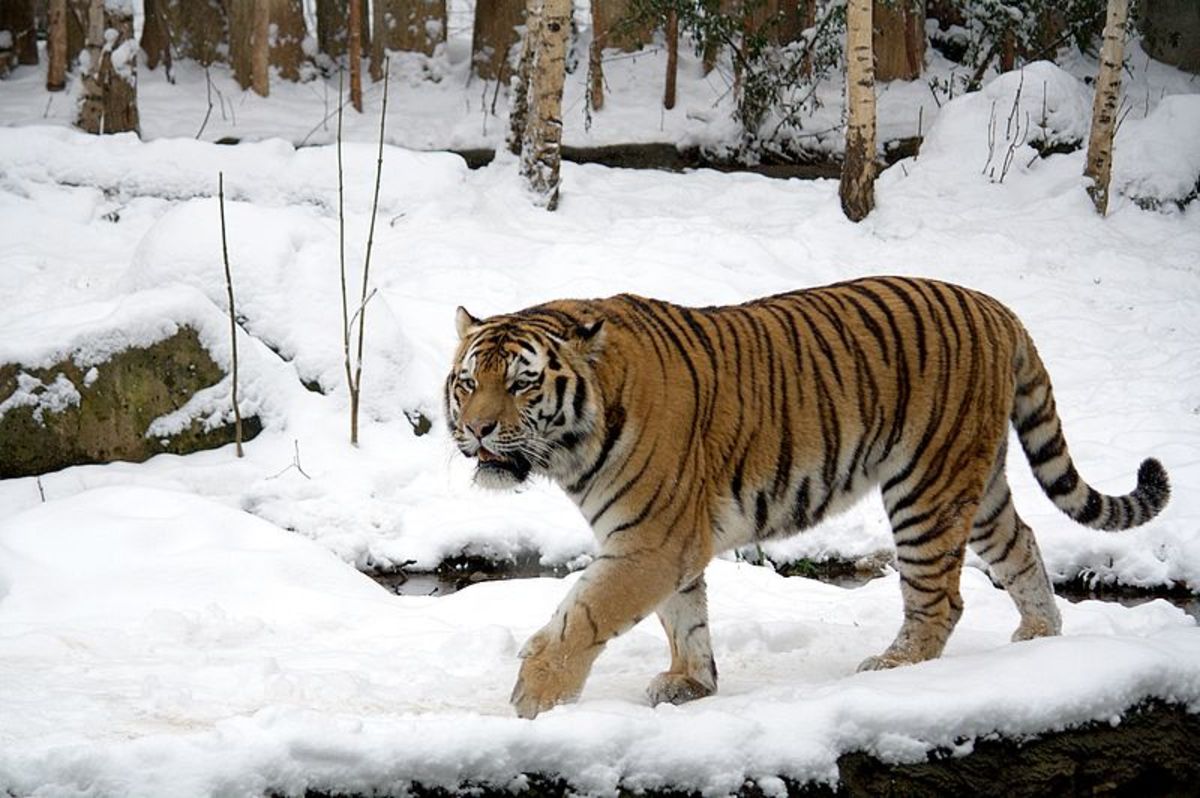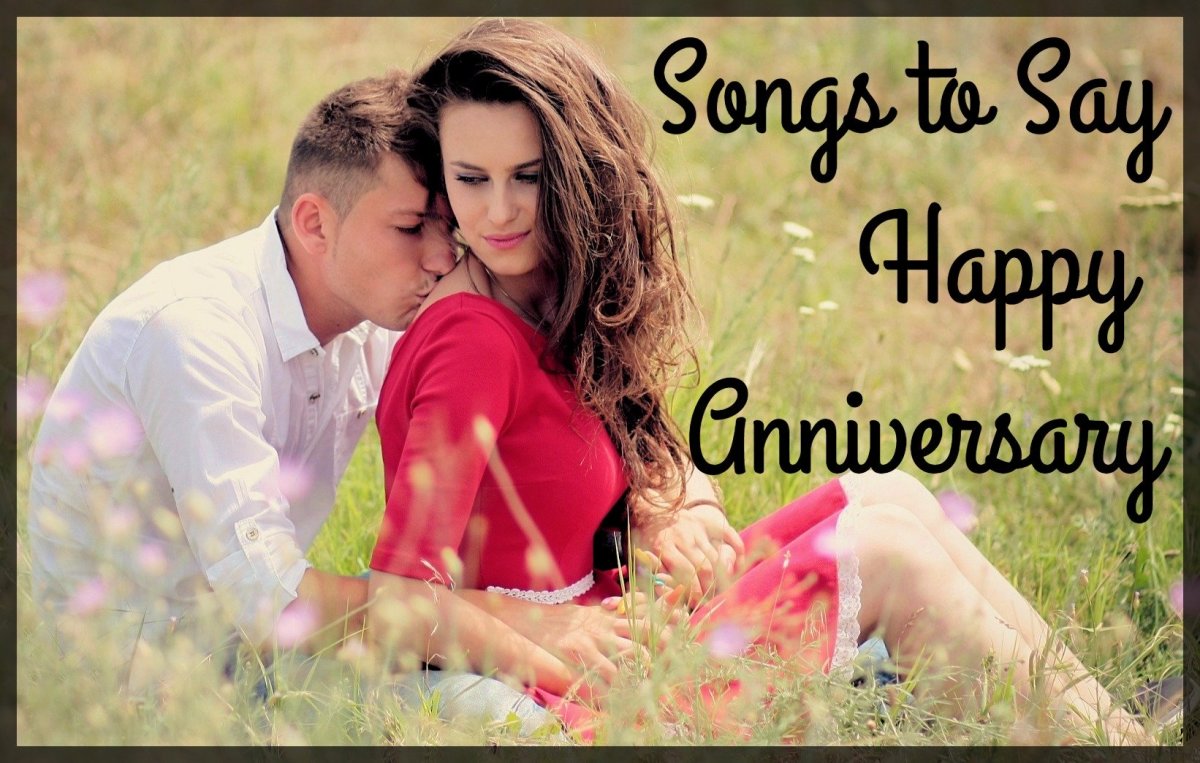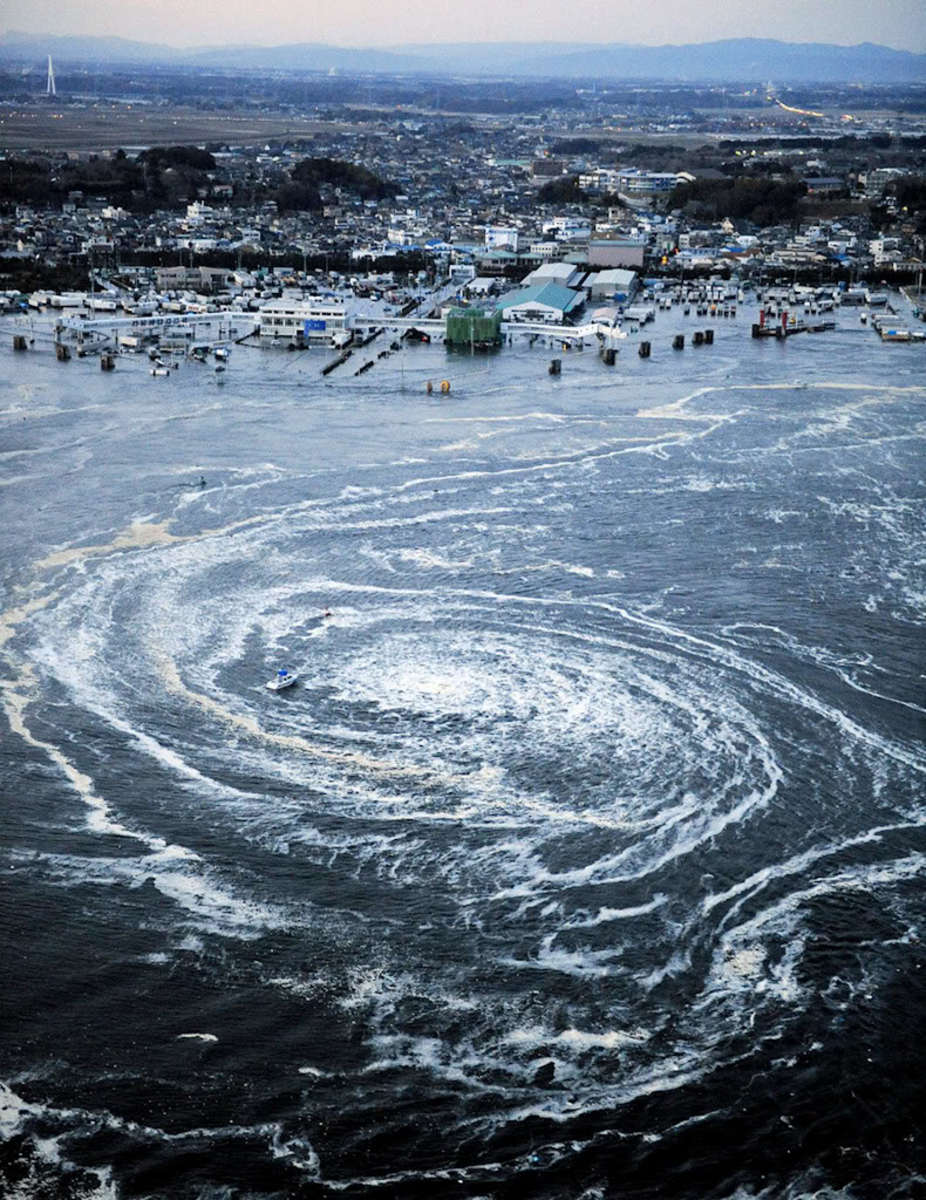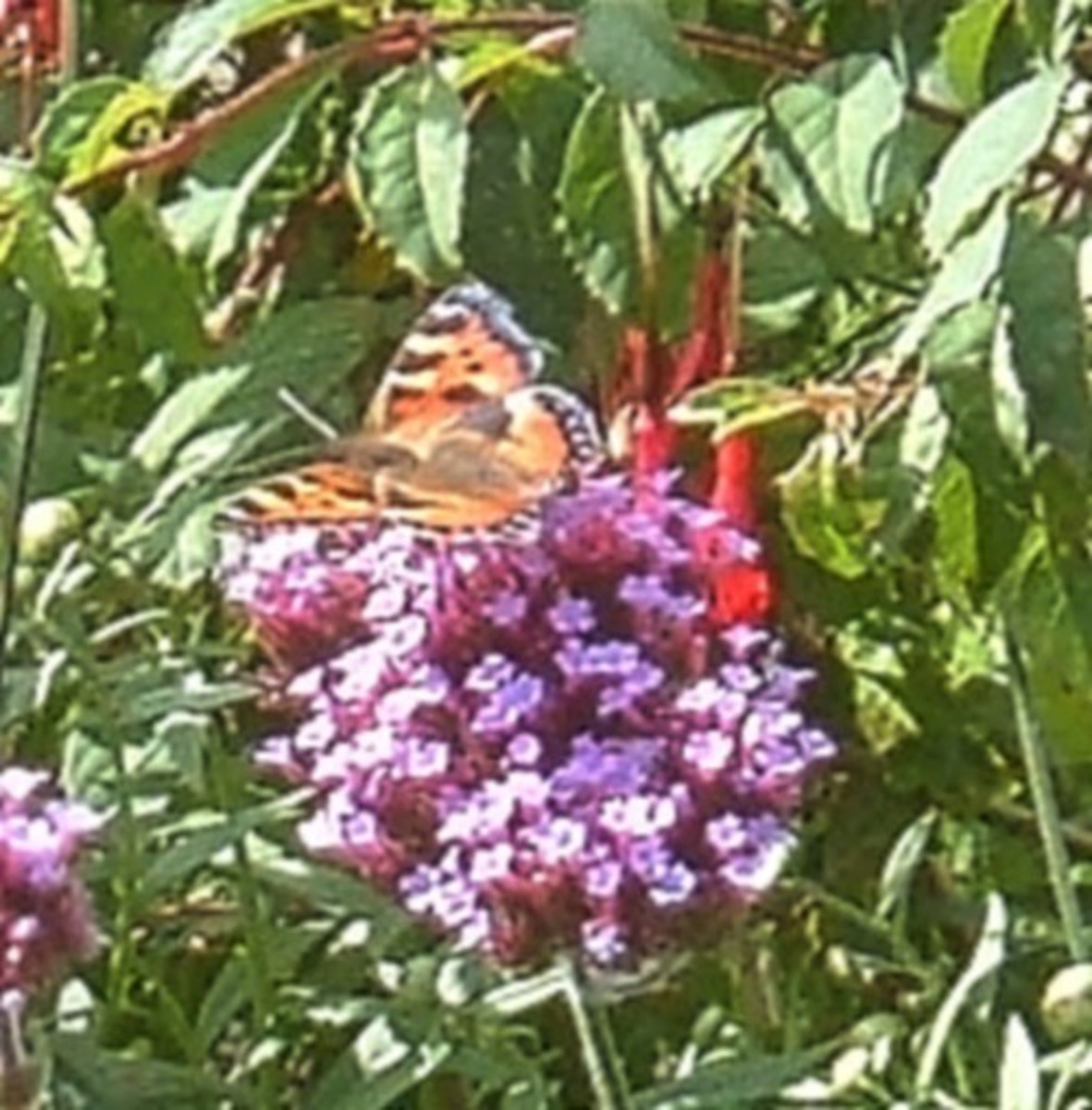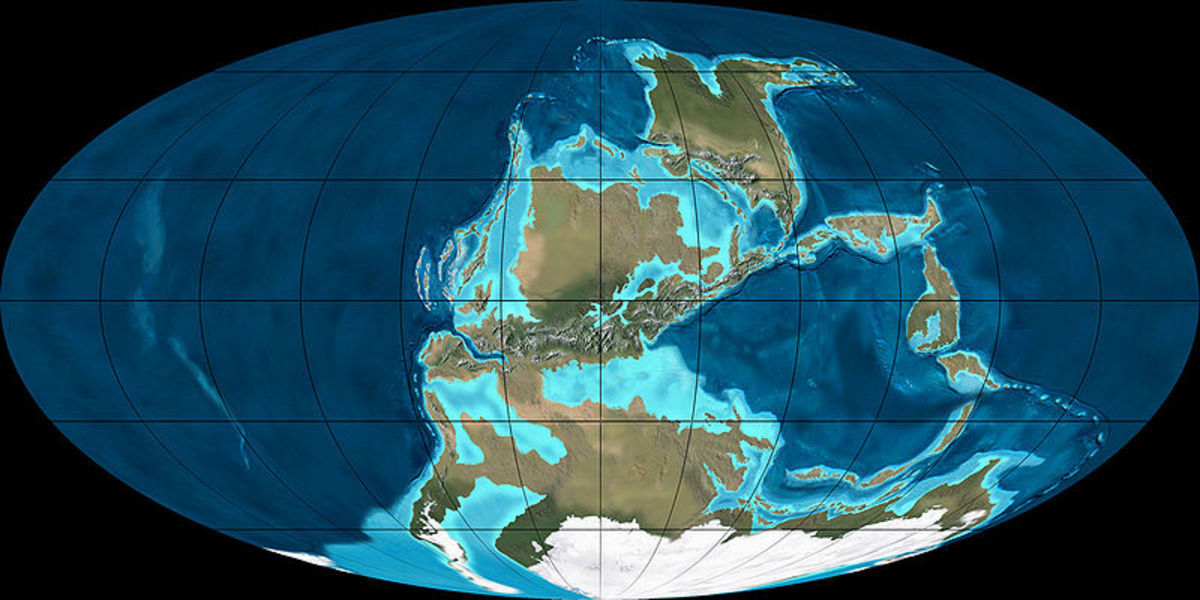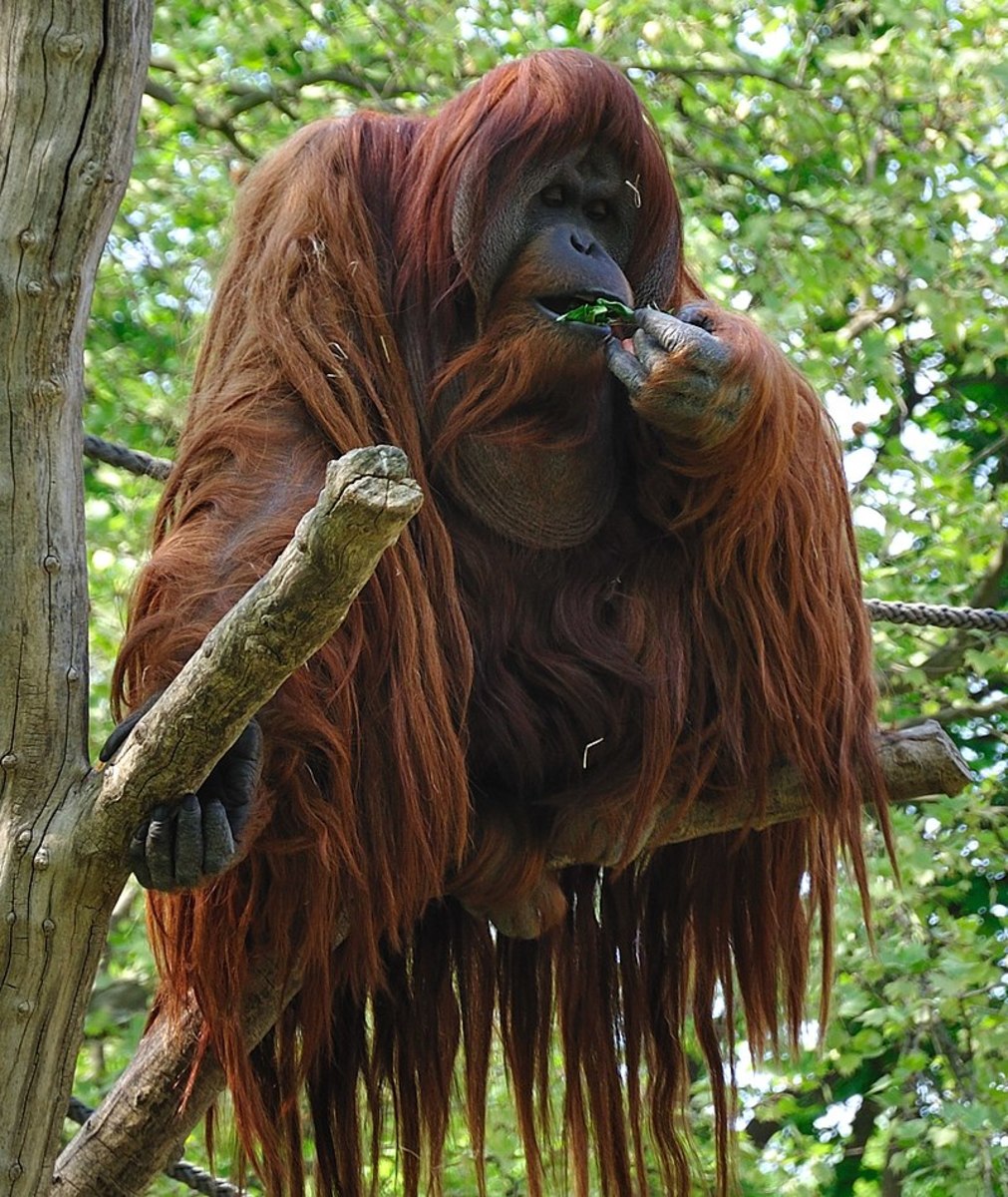A Conservationists Storyline Part 2
Working in the bush
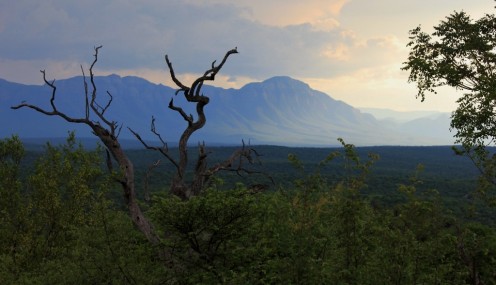
A new life overseas
I arrived in the UK early September, 2006, in a little area called Bassingbourn, just outside of Cambridge. I had done all I could to expect the worst. I’d never been overseas before and spent many years working in the bush, away from civilisation. All I knew about England is that the weather is terrible. The few weeks before leaving South Africa I had built myself up to anticipate the worst; cold and wet every day, mist, snow and cloud.
It turned out to be a beautiful autumn; sunny every day, I was wearing shorts to work (having started at a small zoo as a zookeeper two weeks after landing) and it stayed light until after 9pm. I was lulled into a false sense of security as a result; that first winter hit me hard. According to all around me it was a mild winter, but it made me think Hell had frozen over!
The feelings of trepidation that I’d had before moving over were all coming true. I was really battling to fit in, culturally, work wise and the famous English weather started to wear me down.
I guess it is one thing when you have an office job; going from house to car to office to car to house. I was working outdoors and whatever the weather was, you were in it.
I moved from a nature reserve as big as Wales to working in a zoo about 5 hectares in size. I’d gone from living in the bush for six weeks out of every eight to having the city; cars, noise and light pollution all around me, constantly. I moved from an area where the average maximum temperature for the year is about 25 ºC; summers will stay around 35 ºC and now I was working outdoors in a place where the temperature never goes above 5 degrees for at least two months of the year. I am well aware that the UK is nowhere near the coldest place on earth but for that first winter, it just as well could have been for me!
Added to all this, I was a person that didn’t like zoos and so having to work at a small family-run park like this was a really difficult thing to do. Sure, over the time spent working in UK zoos I changed my mind about them and now fight vociferously for the good zoos, but unless you know that’s coming, it doesn’t really help and I almost felt as if I was being disloyal to the wildlife industry; my industry.
Linton in the snow
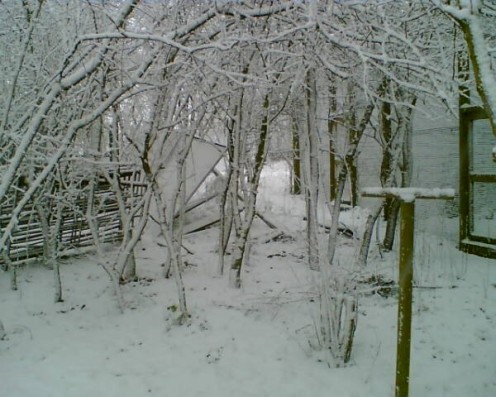
Snow melting off the slide
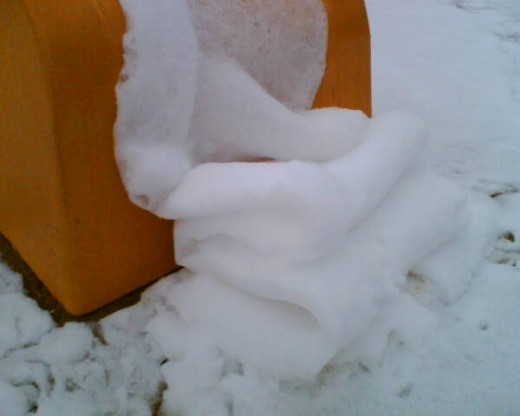
I experienced working in snow for the first time; learning new words like layers. I dressed up so much some days that I could barely climb over the fences. Then I would go and work in the lemur house and spend 5 minutes peeling it all off as it was as warm as could be in there.
The area I was used to being in
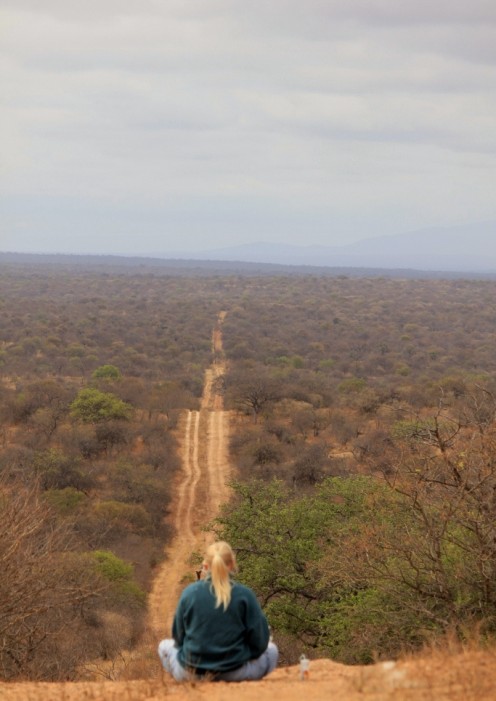
The zoo I worked for was nice enough, but it still took a lot of getting used to. Somehow though, it was still fun; I had my kids, I had good friends and I worked with some amazing animals.
In such a small zoo, all keepers covered all animal types, so I got to deal with tapirs, storks, vultures, owls, lemurs, various reptiles and insects.
One of my previous jobs in South Africa was teaching and flying free-flighted birds in a show type arena. No trickery, just natural behaviour. As a result of this I got to work with the three birds that this zoo used in the summer for much the same. They were two great grey owls (a brother and sister - Odin & Ayesha) and a striated caracara by the name of Dodger. They were truly special birds to work with.
The great greys were incredible and I’m truly honoured for the short opportunity I had to work with them. There is something very special about seeing one come sailing down towards you over an English field; eyes entirely focused on you (and the food).
That first year didn’t go well though as my marriage was dissolving before my eyes; not that it had been in good shape prior to the move. My first summer in England felt like a normal winter back home! I never seemed to be able to get the right clothes. Working outdoors in that kind of environment without being able to buy proper gear means you forever have wet feet and it didn’t help the cause of an already semi-depressed man.
I realise that I sound like nothing other than a whining old fart but you have to realise the massive change I went through. Just having traffic sounds in my head 24-7 was enough to drive me nuts. Where I had come from we would joke about rush hour if we saw 3 cars in an hour on the main road. The nearest town (more of a village in English terms) was 30 minutes away and we had no light pollution. Barring cloudy days, our night skies were mind blowing and there were nights that you could barely recognise constellations as the sky was so brimming with stars.
I’m a professional guide having attained an instructor level. I went from knowing trees, spoors, bird calls, insects, reptiles and doing guided walks in big 5 territory to knowing pretty much nothing. It was scary and pretty cool all at the same time. It was a great challenge to get to learn more but also difficult in that that was my world; knowing stuff and teaching with it and now I couldn’t recognise anything around me.
It just took time to adapt to it all, and soon I would have someone arrive that would help me to make the necessary adaptations to my life.
Snowy Owl
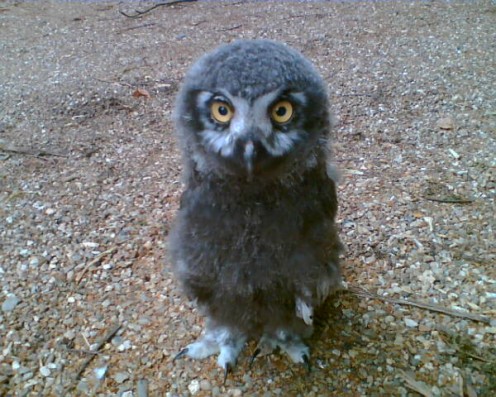
...and so arrived Polly
Polly arrived at Linton one day for an interview for a keeper position. We’d (us keepers) of course heard about her interview and thus nosily kept our eyes open for her in order to discuss her with each other later. We hadn’t known anything about her and didn’t at the time truly care who she was. It didn’t matter whether it was male or female filling the position; it was just how nosy we were every time we knew a new potential keeper was coming. There was a high staff turnover at the zoo due mostly to the owner, who had a notorious reputation in the zoo world. There was many a day we worked till after 7pm and a few nights we worked until 10pm, no overtime. We were always understaffed and we were always pushed to work harder and faster. Added to this we were a really good bunch and we all genuinely wanted to do what was best for our animals. It meant we were all open to abuse as we would happily work late to ensure our animals were living in good, clean enclosures and had good, quality food. There was many an evening I would be running around with a spotlight feeding my owls. We all used to virtually run around that zoo on a daily basis getting cages cleaned and animals fed. Still, it makes it all out to be worse than it was. We had each other and we had loads of fun; behind the bosses back of course.
I was cleaning out by a part of my section that had a line of owls, an enclosure with six hooded vultures, and a leopard enclosure. On the corner, coming from some bamboo lemurs, the leopard, Lisa was there on the left and then, with a sharp left past the vultures up to the owls on the right, and the tiger enclosure on the left; I saw Polly for the first time. I watched her for some time without her knowledge until I felt a bit like a stalker. She was entrancing and there was something about how she looked at the animals; she clearly wanted, needed to be around them and, as I found out later, she had, her whole life.
And so began life with Polly around. It was still a while before we would be together and in fact we became fierce friends before we started going out.
She’s not mine and I’m not hers but rather, we just live our lives together.
The common ground between us is, of course, wildlife. The beauty of it all is that we come at it from two very different angles; hence we get along so well within it all. The fun is that we get to enjoy it all together, at home and at work.
Tanya and me
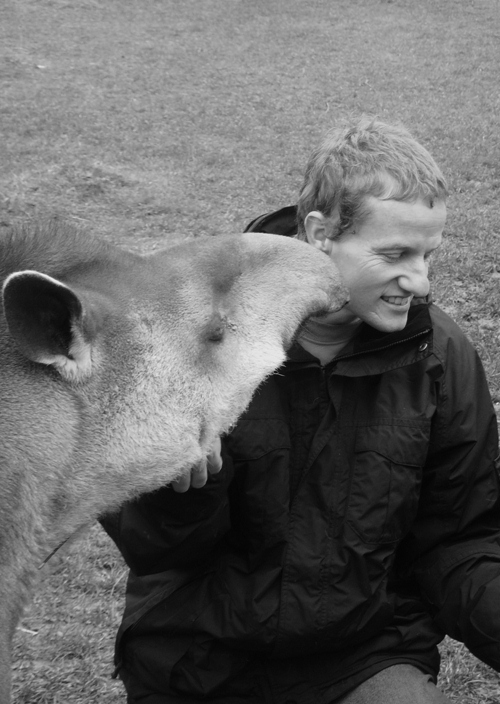
Then life changed
By December of 2007 I was part of the divorce statistics, leaving behind my two children which tore my heart out.
By then, Polly, Ben, Choc and I (all keepers at the zoo) were a virtually inseparable friendship ring and had had many a marvellous time together. It didn’t take long for Polly and me to get together after my divorce.... and let’s just leave that one there shall we. Focus people! We’re here for the wildlife side.
After a tough day at work
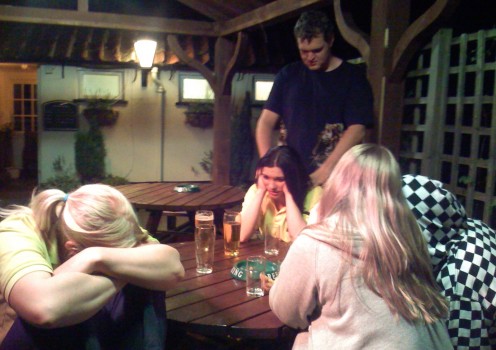
My world of wildlife
As said, and according to the title, this is a wildlife story and I need to try to make sure that I can get you to understand the conservation side of me. My ex doesn’t, but rather seems to think of me as a loser because I work for pittance and don’t seem to care for ‘normal’ things like TV, having the right type of furniture, having the ‘typical’ home life, etc. I don’t think she understands why and how I’ve stayed in it all this time. She cannot seem to comprehend that this is not a career for me, it’s a life. I am unable to do anything else; don’t want to either.
Staying in an industry that does not pay well at all and demands everything you have is tough on your personal life, but it most certainly comes with its advantages.
I’ve had over 16 years of working in incredible places with a wonderful array of animals; hand rearing, releasing, rehabilitating, teaching, spotting, following, studying, training, flying, killing, eating and learning. I’ve hand reared hippo, leopard, impala, spotted and brown hyena, clawless otter, honey badger, zebra, cheetah, wildebeest and genet to name but a few. I’ve released vultures back to the wild and had some die in my arms, their stomachs filled with poisons. I’ve flown the biggest eagles in Africa, flown cranes, toucans, various macaws and ground hornbills. I’ve been close to lions, buffalo, rhino & elephant many times on foot safaris, once I had an elephant cow and her calf come to within 2 metres of me and my guests and stayed there for about fifteen minutes (Polly was in the group too); a life-changing experience. I’ve gone home stinking of tiger urine, lion faeces and horse blood on many an occasion. I have been peed & pooped on and bitten by countless things over the years and still I am yet to come across an animal I don’t like. Am I bragging? No, of course not, and I hope it doesn’t come across that way.
I’ve killed my fair share of animals too. I’ve killed a lot in order to use as food for other animals; more chickens, rabbits, guinea pigs, rats and mice than I’d care to imagine. I’ve killed some animals just to put them out of their misery and suffering and some I have killed for food. I’ve never killed for pleasure and I don’t intend to.
Yes, that’s correct, I’m not a bunny hugger, I’m a conservationist and I try to be one in everything that I do. It’s hard to define what a conservationist is. My dictionary defines it as “a person who maintains natural areas or protects threatened species or someone who advocates for these actions”. I like to think that it is more than that. By the very way that you run your life you can practice conservation. Buying the right products in New York City can go a long way to saving species in Borneo. Buying the right wooden furniture in Germany can help protect a forest in Indonesia. The three days after 9/11, when all flights were stopped, helped scientists actually prove that the escalation of flights in Europe & the UK have had a direct effect on the droughts in Africa, making them worse - it’s called global dimming.
Priorities
Which of the following would you regard as most important?
Re-thinking our ways
In today’s world you have to think about your water footprint, your carbon footprint, the use of palm oil, organic/free range chicken or battery farming, home-grown local goodies or imports, MSG and your salt, sugar and fat content; to name just some. We are bombarded daily with what is good and what is bad for us by all the new scientific findings.
Palm Oil
Committed to conservation
Being true to wildlife takes genuine commitment and means changing everything you do and think in life. I think about what and how I eat. I think about all products I buy, edible or not. I consider the companies I support when buying their products. I think about where I go and what I visit and support (especially in the captive world). Everything we do has consequences; cause and effect.
For example, I cannot approve of white tigers whilst claiming to support wildlife. It is a complete contradiction and in doing so I will go against all I believe and fight for.
http://peterdickinson.hubpages.com/hub/White-Tiger-Breeding-is-Not-Conservation
I don’t have much time for domestic cats as I know all about, and have seen firsthand, the damage they do to the wildlife that keeps me alive on this planet. There is an ongoing war over these issues at this very moment and I have no wish to go into it all here right now....maybe in another blog?
The use of palm oil will and does affect so many people and species today. How many people are aware of this?
We’re so often caught up in fighting little battles that we have no idea about the full-scale war going on as I write. Companies will do anything to gain consumer support.
Back on track
I’m going off on tangents now and need to get back to the story at hand. I’ll be coming back to the statements above at some stage as they are as integral a part of my life as my kids and Polly are. I know more about the damage being done to people and this planet than I ever care to.
I will pause just long enough to give you one more piece of information, as I believe it to be relevant to the whole story I am busy writing, still as you read this. In fact, as you are reading, I am standing over my computer, trying to write in the dimmed light of the lounge, fending off a young otter with my slippered foot as she tries merrily to chew on my toes. I will get to her in later stories but I couldn’t help but mention her now, along with a photo below.
Lily the otter, out and about with Polly
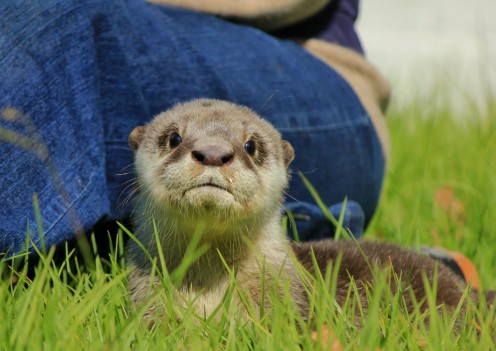
Lily the otter
A positive change
That first year in the UK was a roller coaster ride for me; moving to the UK, my first real winter in life, a divorce, meeting Polly, making exceptional friends, a new and difficult job, and just learning the English way about things.
I was coming to the end of my time at that first zoo in the UK. I was frustrated there, not progressing, and needed to move on. I was looking around but not finding anything suitable for me.
Ironically my ex wife came to my aid. She found an advert for a vacancy as a ranger working at Europe’s first overnight safari lodge. This sounded like something that was just ideal for me.
I applied online, got granted an interview; and got the job! I was on my way to a new adventure...at Port Lympne Wild Animal Parks’ Livingstone Lodge in Kent.
Moving down to this area turned out to be a really good move and it was here that I got to see the really positive side of zoos as well as going on to thoroughly enjoy keepering as a job, working alongside some marvellous keepers.
Wildebeests with a view
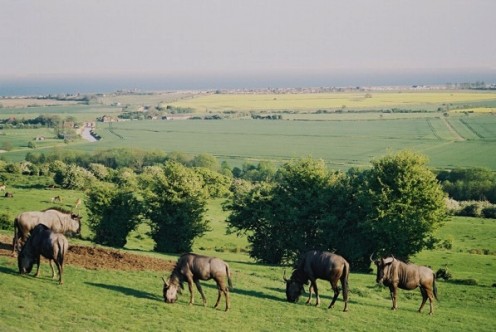
The lodge
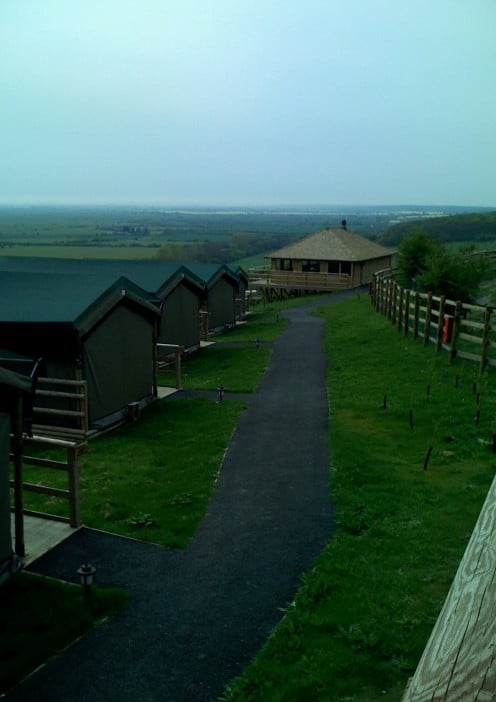
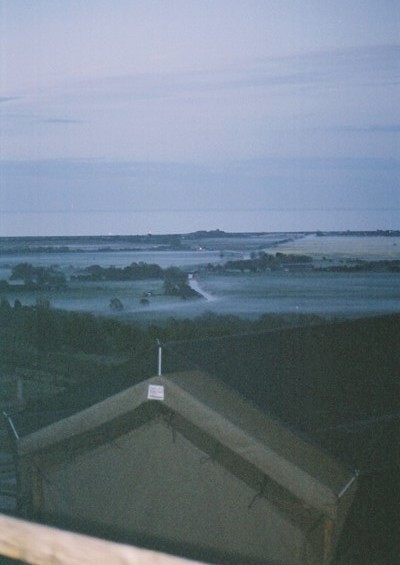
Livingstone Lodge
Initially, as said above, I started as a ranger for a beautiful tented camp. Firstly, ranger isn’t quite the right terminology for the job I did. A ranger is a person who works in and manages the bush and has little to no dealings with public; nor do they want to deal with public. The position was in fact for a guide; which is someone that works with people, in and around the wildlife and bush environment. This is what I did at the lodge; taking people on a guided tour of part of the park and then slipping into the area that wasn’t accessible to everyone and ending up at the lodge itself. There they were treated to a 5 star dinner and conversation with ‘genuine African rangers’. There was myself and the head guide Warren, originally from Zimbabwe, and we did regale our guests as we were, genuinely, the real McCoy.
Essentially, we regaled too well I think. Warren had been a part of things like Operation Black Rhino in the 80’s, he had done professional hunting, culling of buffalo & elephant, had been a ranger in Hwange National Park; he had been a genuine ranger in his time whereas I had just been a guide. Not too many people understood old Warren over there at Port Lympne and he got a few peoples backs up as a result.
As I explained to Polly one day (she had as yet never been to Africa); “you cannot understand anything about what I have done and seen, and I can barely understand what Warren has done and seen; what can any of you comprehend about his world?”
He was great to work with though and the two of us got along very well. He may have been the ranger I would have liked to be but I had done a lot of things he didn’t know anything about, and so we complimented each other quite well when taking our guests out for drives as well as talking to them around the lodge and over dinner.
Working at the lodge was good fun, and a little of what comes so naturally for me, teaching and being a guide. The difficulty was the accommodation; we lived on site 5 nights out of 7, just hitting 2 ½ days off. This was how they managed to compensate for our hours worked, since the days would begin at 5am and generally go on to about 11pm or so, sometimes later. I was used to the hours from working in the bush and it was worth it. What we got to see out there on drives and walks, what we would see and hear at night, the people from all over the world that you got to meet; it is always worth it.
My kids on safari in the UK
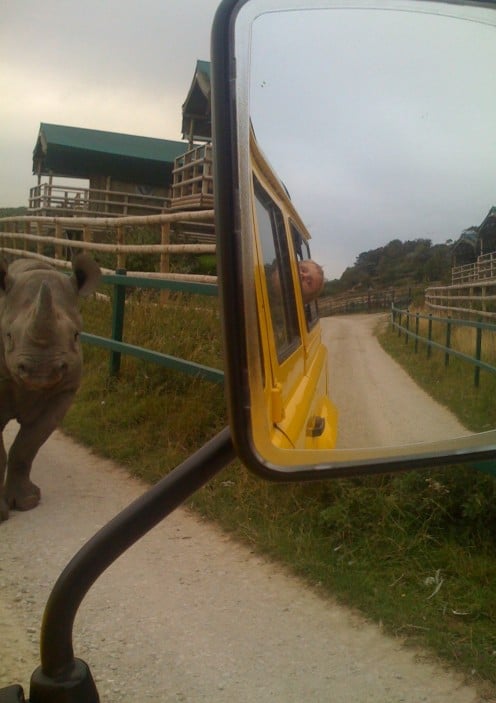
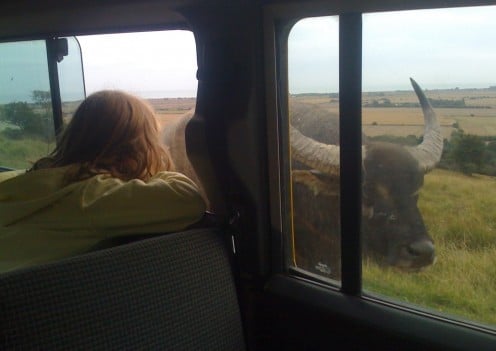
As said though, it was the accommodation that was difficult; you see, it was a tented camp, and although the guests stayed only one night, we stayed there for five nights every week. The camp was open from late April to early October. It was not a bad summer the year I spent there, but the beginning and final weeks were truly cold, after all, this was Kent not Africa.
Still, the place was situated on a hill and overlooked an area known as Romney Marsh; some of the most fertile soils in England I’m told. Standing on the deck of the lodge you see in the distance the English Channel, this beautiful expanse of what is Romney Marsh and, a bit closer in, a black rhino, or a giraffe, a wildebeest or zebra; very surreal. It was always filled with beautiful views, regardless of the weather. That, along with the animals around us, certainly made it a marvellous experience.
Animals around the lodge
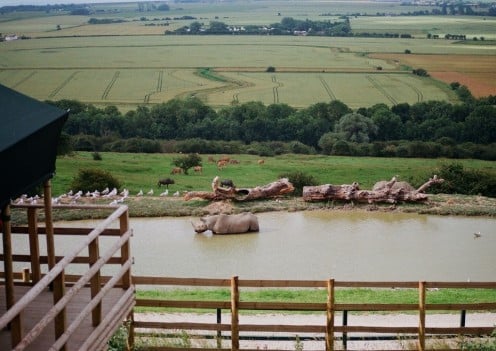
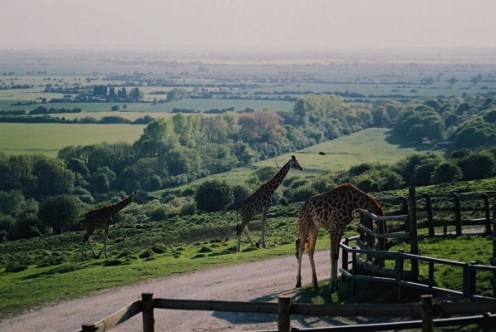
The realities
I must confess that I found it incredibly difficult teaching the English about African wildlife and conservation, with an undeniably English backdrop. Regardless, we were still in a zoo. Warren and I would happily discuss controversial subjects like professional hunting and culling when talking about black rhino and elephant.
It was a whole new challenge for me to explain and describe the troubles that elephant’s cause to people and their livelihoods; and indeed I mostly failed, especially when you have three semi-tame elephants with names and known personalities wandering around an enclosure behind you.
There are still a huge amount of people in Africa that pretty much live off of the land. Their backyards contain enough planted food to sustain the village for a year. The village might only consist of about 30 people and together they farm that land, hunt, and live as a community. For some they may even have a small piece of land with enough food growing to feed one family only. These people have limited contact with the so-called real world; the world that you and I know exists. TV, internet, electricity, telephones, flush toilets, running water, restaurants; hell, none of these things that we take so for granted on a daily basis exist in these peoples’ world. Are they primitive? No, of course not; their lot in life is just different to yours and mine.
The fact remains that one night an elephant could and does walk into their land and in less than 20 minutes it will destroy their crops, entirely. Bearing in mind that this is their only source of food, how can you possibly expect them to have sympathy for that animal? Why should they want to keep it alive?
One night you’re asleep next to your family on the floor of your hut, the next minute you are being dragged into the bushes in the jaws of a lion or leopard. Your family can do nothing but stand in the darkness and hear you being eaten. How can they possibly comprehend that you, as a tourist, will spend more money in one holiday to see these lions than most of these people will see in their lifetimes?
Going down to the river to fetch water or wash clothes is potentially life-threatening with hippos and crocodiles around. These two animals are forever vying for the position of killing more humans than other animals. Of course, there is one genuine winner of that award and that is the mosquito.
I’m not trying to be macabre or depressing here but it is important to try and understand the other side of things.
The human wildlife conflict (HWC)
- Save me from the Lion's Mouth: Exposing Human Wildlife Conflict in Africa
A well written book that highlights the grim realities of living with wild animals in your back yard.
Conclusion
It was a tough year, one that I shall never forget, and I am truly glad to have met Warren along the way. I was not sure I could handle another year of that kind of teaching though and, while out of season, I found myself quite interested in a position that was being advertised; large carnivore keeper. It was also at Port Lympne so it would just be an internal transfer and also meant I had a fairly good chance of getting the position.
I did, and thus began the last remaining days for me in the UK....
End of part II. The next instalment of my life’s account will revolve mostly around the carnivore keepering days. I will go back in time slightly and just explain where Polly went and was in all of this.
After that the two of us are off for an African adventure of our own, one we are still paving out at present. I hope you enjoyed this instalment and I look forward to publishing part III, something I am working on already.
